Why Maison Ikkoku is the Greatest Love Story of All Time
by Caitlin Moore,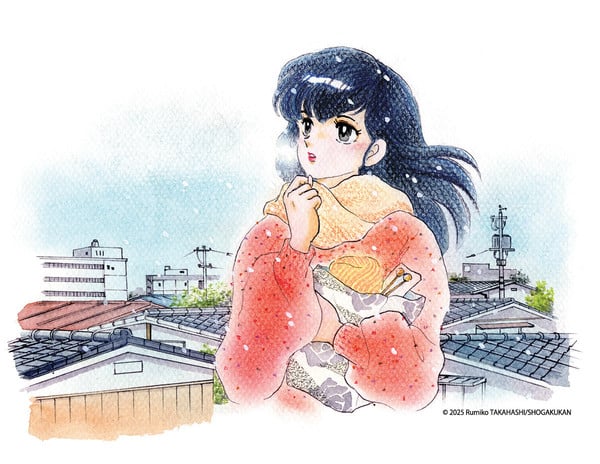
Pride and Prejudice. Romeo and Juliet. The Notebook. These are some of the stories considered the greatest romances of all time, but to me, none of them compares to Maison Ikkoku, Rumiko Takahashi's seminal love story. It takes fifteen volumes for the downtrodden student Yusaku Godai and his apartment manager Kyoko Otonashi to find their way to one another, from the moment he sees Kyoko walking through the door of the building for the first time. While those fifteen volumes are filled with wacky hijinks and muddled misunderstandings, they are also shot through with character growth, emotional recovery, and a deep sense of humanity. It is a love story that spans six years, giving the characters time to become the people they need to be.
It all begins when Yusaku Godai, a ronin struggling to get into even a third-rate college, declares he's going to move out while being harassed by the other tenants insisting on partying in his room. However, right before he can walk out the door, he runs into the new building manager: Kyoko Otonashi. She's young, she's beautiful, and Godai instantly changes his mind about leaving. However, Kyoko won't be so easy to win over; as Godai soon learns, she is recently widowed and actively grieving her departed husband, Soichiro. Instead of giving up, Godai decides he will win her over, even if it takes years.
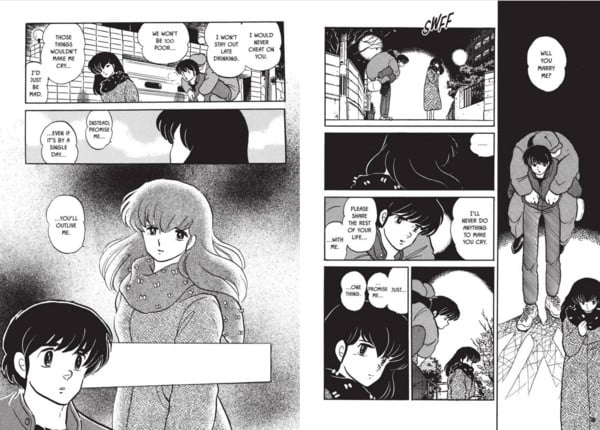
And it does indeed take years! Maison Ikkoku tracks Godai's growth from getting into college, struggling to graduate, struggling to find a job, and finally coming into his own as a human being. It follows Kyoko's journey through grief, as her memories of Soichiro slip into the background of her life instead of a constant presence in the foreground of her mind, and she can allow herself to love again. Kyoko and Godai getting together before the story's climax would have been a disaster for both. His wishy-washiness, her preoccupation with Soichiro, and both of their immaturity would have doomed the relationship before it started.
It's easy to see why Godai fell in love with Kyoko. She's gorgeous, treats him with kindness when the other tenants mock and tease him, and seems gentle and ladylike at first glance. His redeeming qualities take a bit longer to reveal themselves, but beneath the downtrodden surface lies a sensitive and kind young man. This isn't immediately apparent, since the earliest chapters of Maison Ikkoku are a bit closer to the slapstick Urusei Yatsura in tone before settling into a gentler romantic comedy rhythm. When the people around Kyoko pressure her to remarry, Godai is the only one to stand up for her and tell them she isn't ready yet, even though it's a difficult truth for him to face.
On the other hand, they're both kind of nightmare people who sabotage themselves at every step. Kyoko is rigid, passive-aggressive, and prone to jealousy even though she isn't actually dating Godai. Even early on, when she is still actively mourning Soichiro, she gets mad about Godai getting calls from girls, refusing to listen when he tries to explain that they're just members of the puppetry club he's in. She puts on airs of being an adult, having been married, when she's still just as emotionally childish as Godai. He, meanwhile, is indecisive and irresponsible; he struggles to choose between even the simplest options, skips class, and gets dragged into escapades because he can't stand up for himself. Neither of them can communicate worth a damn.
In the hands of a lesser writer, these flaws would have made Maison Ikkoku unreadable; at best, it would have worked as a Wuthering Heights-style drama about two awful people making each other worse. However, the strength of Takahashi's writing makes the two palatable, even lovable. Their flaws make it possible for them to grow as they travel along on their emotional journey, leading us to root for them every time they make a breakthrough and a step forward. When they take steps back, it may be frustrating, but it's still organic and informed by who they are as people, rather than contrived obstacles designed to extend the series past its natural stopping point.
No matter how frustrated you get, no matter how goofy the slapstick, there are moments that make you stop and remember that Kyoko and Godai are, fundamentally, decent human beings connecting and growing closer over time. After defending Kyoko at a party, the two sit in a park, and he asks her to wait three years for him to graduate. They dress up in their high school uniforms while drunk and act silly. Kyoko supports Godai, whose leg is in a cast, when he drops his crutch during a walk together. This is the stuff that gradually falling in love is made of: not the drama, but the times they're there for each other. The times they have fun together. The times they get a little closer to knowing one another's cores.
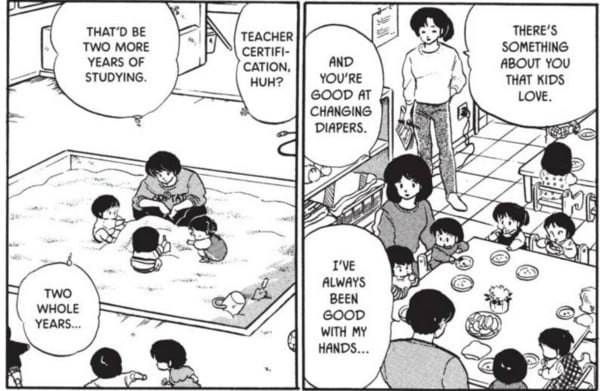
One of the most classic romantic comedy plot twists is the introduction of a rival character, often at the eleventh hour, to continue the conflict through jealousy. However, the rivals – Shun Mitaka, a handsome, wealthy tennis coach, and Kozue Nanao, a cute, sweet college girl – enter the story within the first volume. Their presence from the start lets them act as foils to Godai and Kyoko, full characters in their own right, rather than mere obstacles. Godai and Mitaka have an actively antagonistic relationship, with Mitaka needling Godai and triggering Godai's insecurities. But while Mitaka has the masculine qualities that Godai lacks, he also has opposing weaknesses. While he, too, is a good person at heart, he can be arrogant and pushy, often encouraging Kyoko to remarry. He's also terrified of dogs, a big issue when Kyoko has a pet dog of her own.
Kozue is a more passive participant in the plot, going on occasional dates with Godai for much of the manga. She's sweet, adores Godai, and has grown up without hardship, whereas Kyoko is complicated, messy, and mired in the emotional damage of being widowed at such a young age. Her presence emphasizes how easy it would be for Godai to have something simple and uncomplicated with a girl who asks little of him. Despite this, he desires the tempestuous, emotionally unavailable widow, devoting himself entirely to winning her over. She's a consistent source of jealousy for Kyoko, who stomps around and makes passive-aggressive statements every time she and Godai go on a date. Sadly, Kozue receives little justice in the narrative, and sometimes it's hard not to resent Godai for stringing her along, unable to muster the courage to break up with her when his heart belongs to someone else.
Kyoko and Godai's positions within the story can be envisioned as two sloping lines, gradually getting closer to the point where they intersect. They are growing together, but each with their own trajectory. Just as Kyoko moves toward being ready to move forward from the death of her husband, Godai must reach his own maturity. He thinks that point will be once he gets a well-paying corporate job, as is expected of college-educated Japanese men in the '80s, but it's actually the point where he stops striving toward what he thinks is what's required of him by masculinity. He compares himself constantly to Mitaka and his assumptions about Soichiro, egged on by the other residents of the Ikkoku. However, after a couple of false starts at a corporate career, he ends up working at a preschool and finds that not only does he enjoy it, but he's good at it in a way that he's never been good at anything else. Though at first he feels self-conscious about working in a traditionally feminine field, he comes to accept himself and gets his childcare license.
As their two arcs near one another, the last issues driving them apart come to the surface. After over a dozen volumes of comedic misunderstandings and sitcom antics punctuated with moments of growth and sincerity, they finally have to confront things head-on. After Kyoko sees Kozue kissing Godai, a move she tricked him into, she storms off back to her parents' home. Frustrated, fellow Akemi teases Kyoko about making a move on Godai herself until, in a gorgeous moment of catharsis, she calls out Kyoko for acting jealous while pushing away Godai's advances. Shortly after, Kyoko and Godai go to a love hotel together, but he finds himself unable to perform, thinking of Soichiro and hoping she'll forget about him. They cannot get together while he is haunted by Soichiro's specter.
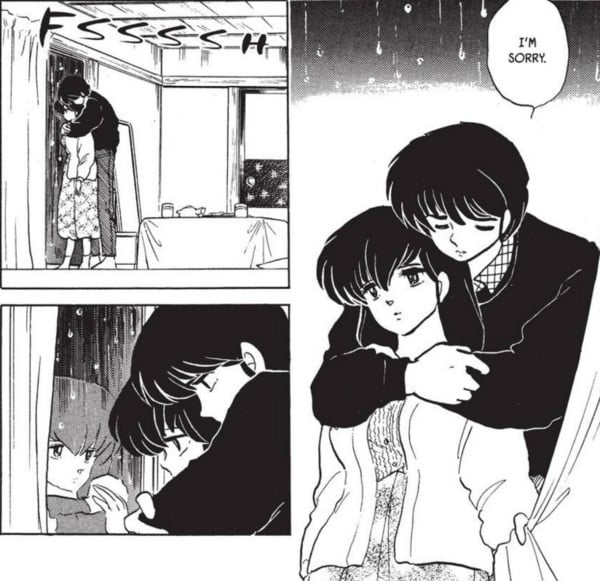
It's an uncomfortable and awkward scene, and they both leave feeling disappointed and unsatisfied. This could have led to another ten chapters of bumbling about, but instead, they talk. They express their feelings. They communicate in a way they never have before, as two adults sitting in a room trying to convey and understand one another's thoughts. They're having the same kind of conversation that countless real couples, feeling out the early stages of a relationship, have had. And once they've communicated verbally, they can finally, finally express their love physically.
Even the most grounded love stories rarely include these kinds of conversations; generally, they're not considered very exciting. And yet, in many ways, this is the climactic scene of Maison Ikkoku. It's the moment when Kyoko and Godai finally overcome the hangups that have been keeping them apart. That is one of the keys to the story's greatness: that real love isn't about the dramatic confessions or grand gestures. It's in connection and communication, in how you make up after a fight, in just spending time together.
But the story doesn't end there. There are still things to be resolved.
It seems hasty, Godai deciding to propose to Kyoko so soon after they actually start dating, but once their lines have intersected, they can never be separated again. Kyoko, as well, is expecting it. Still, they get held back once again by his tendency to circle around things, and Kyoko's opposite tendency not to pick up on indirect communication. But once again, it comes down to the quiet, intimate moments: as they walk home from the goodbye party for his last day at his cabaret babysitting job, Kyoko's ill father unconscious on Godai's back, he simply asks her to marry him. In a response that never fails to make me cry even just thinking about it, Kyoko turns around and gives him one condition: he must outlive her, even if it's just by a day, because she can't go through the pain of losing the one she loves again.
In a following chapter, Kyoko shows Godai her wedding pictures, finally allowing him to see the face of the man whom he has idealized as his ghostly rival for all these years. She gathers up his remaining belongings to return to his family, and the two decide to visit Soichiro's grave together. However, Godai decides to visit alone first and talks to Soichiro about how his memory is a part of Kyoko now, a part that he loves and accepts just as much as everything else about her.
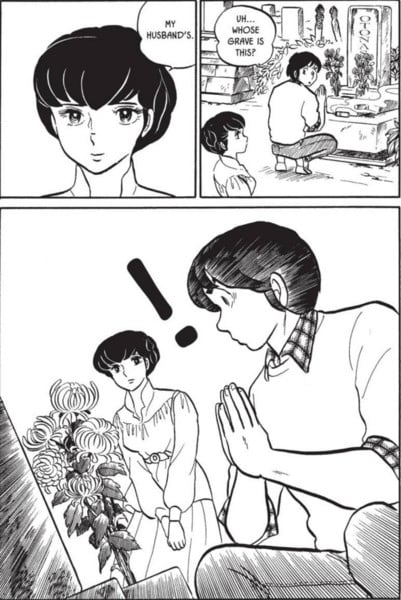
Kyoko has allowed herself the vulnerability it takes to love again; even with her condition, she knows she's opening herself up to the possibility of loss and grief again. She knows that falling in love with Godai doesn't negate what she had with Soichiro. Likewise, Godai has finally achieved maturity and self-actualization, no longer comparing himself to a constructed idea of masculinity, but instead accepting himself and Kyoko for who they are. Neither of them could have reached this point without years of growth, nor could they have forged such a strong relationship.
Maison Ikkoku is not the best romance manga of all time. It's too messy and farcical for that, going down some frustrating narrative cul-de-sacs without any forward momentum. However, it also recognizes that a love story is never just a love story; it's the story of the conditions required for two individuals' narratives to come together. In that, it must be a comedy, a drama, a coming-of-age story, and a tale of grief and recovery. It is the rivals' story, just as much as the main characters'. It's about two contexts becoming one. And that is why Kyoko and Godai's love story is the greatest ever told.
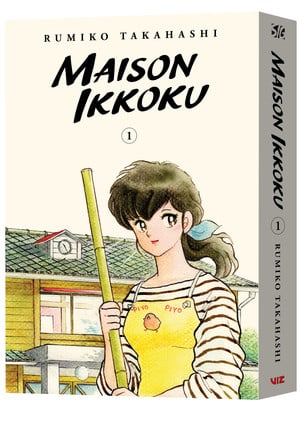
The views and opinions expressed in this article are solely those of the author(s) and do not necessarily represent the views of Anime News Network, its employees, owners, or sponsors.
discuss this in the forum (2 posts) |